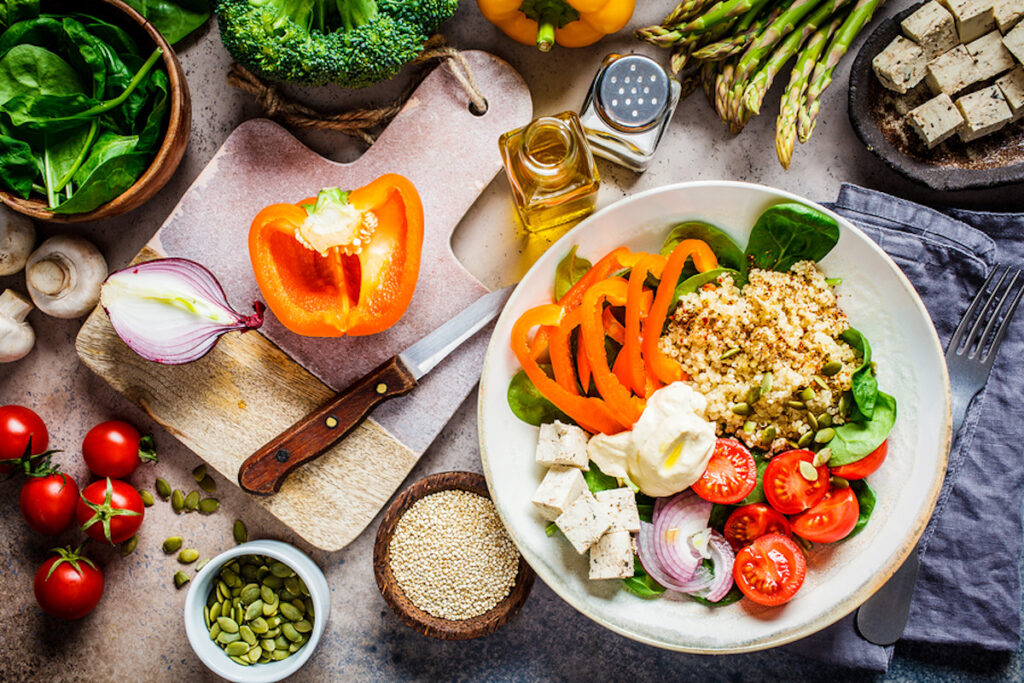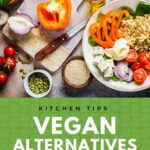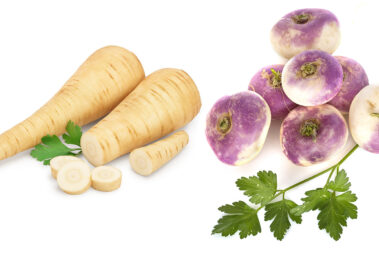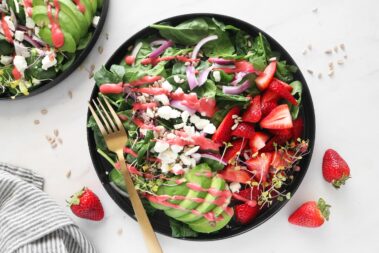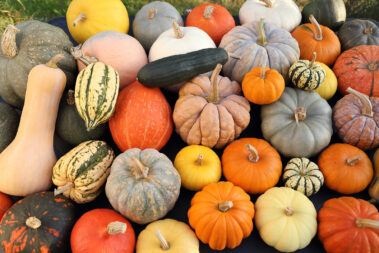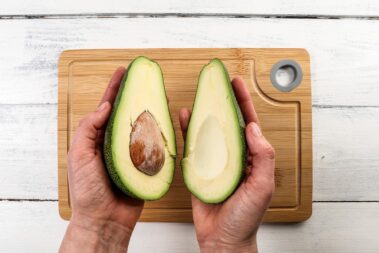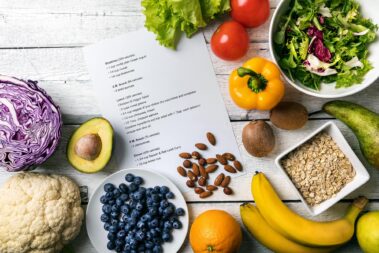If you’ve recently made the switch to a healthier and more planet-friendly plant-based diet, you are probably already feeling the squeeze that comes with limited recipe options.
But adhering to a vegan diet doesn’t mean you need only read vegan-specific cookbooks or search only plant-based recipe websites. In fact, the savvy vegan can easily transform just about any recipe into a meatless and dairy-free plate with just a few simple tricks.
Today I am going to share the best of those tricks with you so you too can branch out from the typical vegan fair and start preparing meals and desserts that even your carnivore friends would be happy to devour.
As a bonus, these tricks also work well when your pantry is running bare and social-distancing has you limiting your trips to the grocery store.
Table of Contents
Vegan Substitutes in Baking
When it comes to baking, it is easy to miss the butter and eggs that are all-too-important for elevating your standard cake or dessert. Luckily, there are a number of simple vegan alternatives you can use in place of these common animal products.
In many cases, these vegan substitutes happen to not only be more nutritionally dense than their animal-sourced counterparts, but they are typically lower in calories as well.
Applesauce
Not only does applesauce add a healthier touch of sweetness to many baked goods, but it also works beautifully as an egg substitute in many dishes. It is sticky enough to bind dry ingredients together and just the right consistency to not make your batter or crust too runny.
As a bonus, applesauce is fat and cholesterol-free.
Use about 3 to 4 tablespoons of organic, no-sugar-added applesauce in place of one egg.
Homemade Flax Egg
Another great way to replace eggs in your dessert dishes is by making your own homemade flax eggs. Don’t worry, this process requires almost no additional work from you. Simply mix 1 tablespoon of ground flaxseed with 3 tablespoons of cold water to replace 1 egg. Mix well and allow to sit for about 5 minutes before adding to your recipe.
The fats in the flaxseed meal mix with the liquid to create a gelatinous substance very similar to egg whites. But, unlike chicken eggs, this substitute is packed with healthy omega fatty acids and tons of fiber.
This same process works with chia seeds in place of flax if that’s all you have on hand.
Plant-Based Milks
If your muffin, cupcake, or other sweet-treat recipe calls for whole or skim cow’s milk, you can usually get away with simply substituting almond, oat, rice, soy, or other types of plant milk at a one to one ratio.
You can use this same ratio for buttermilk, but you will also need to add a touch of vinegar to make up for the acidity you’ll lose. One teaspoon of vinegar for every cup of replaced buttermilk should do the trick.
If your recipe calls for cream, you can still use your plant milk in its place, but you will also need to account for the missing fat. For example, if your recipe calls for 1 cup of heavy cream, use about ¾ cup plant milk and about ¼ cup oil. If it calls for 1 cup of half and half, use about ⅞ cup plant milk and a tablespoon of oil.
Vegetable and Coconut Oil
It doesn’t take much creativity to replace butter in your baking recipes with a vegan alternative, but knowing which plant-based oil to use for different situations will make your life a little easier.
Coconut oil stored at room temperature has a similar consistency to soft butter and margarine and makes a perfect substitute for these in baking recipes. It is also a great choice for greasing muffin and cake pans.
Olive, avocado, and vegetable oil all have a neutral flavor and work well as a melted butter replacement for baking. Do keep in mind that if the recipe calls for salted butter, you will need to add about a ½ teaspoon of salt per 1 cup of oil.
For recipes that call for cutting in hard butter, your options are more limited. A quality vegan stick butter from the supermarket is your best bet in these situations.
Aquafaba
If you were unaware that there was a special name for the thick liquid that comes in cans of chickpeas, here is your overdue introduction! This strange viscous water has all the right properties to mimic egg whites in baking and will even stand up like meringue when beaten.
It has a slightly earthier taste than egg whites, so some extra sweetener is a must, but there really is no better substitute than this in many dishes. You can even use it in place of melted marshmallow.
Vegan Substitutes in Savory Recipes
Once you get into savory cooking, it can be a little more difficult to find vegan substitutes. Cheeses, cream, eggs, and butter are all staples in savory sauces and as high-fat additives to the dishes themselves.
Luckily, in addition to the recommendations above, there is a long list of vegan ingredient substitutions that can actually elevate your savory dish while simultaneously making it healthier.
Nutritional Yeast
If you’ve ever made a homemade version of macaroni and cheese or some kind of cashew sauce pasta, odds are you are somewhat familiar with nutritional yeast.
Nutritional yeast is the processed form of Saccharomyces cerevisiae, the same strain of yeast used to brew beer and make bread. But unlike yeast packets you buy to add to your quick bread recipes, this yeast product is already deactivated before it is packaged. Many commercial forms are also fortified with B vitamins.
Nutritional yeast has a cheesy flavor and is often used in conjunction with nut and potato creams to create cheese sauces. You can also use it by itself in place of parmesan on top of pasta, but we recommend adding it to some processed almonds and garlic for an exceptionally tasty topper.
Nuts
Whether soaked and blended or toasted and crumbled, nuts can add a lot of character to any dish that seems lost without its animal-sourced ingredients.
Cashews are often used as a base for simple cheese spreads and sauces. Soaking them for a few hours beforehand lends itself to a smoother sauce, but it isn’t necessary, especially if you have a high powered blender. Mixing some nutritional yeast, garlic, and salt in as you blend will give you the beginnings of a cheese alternative that can be tailored for many different recipes.
Almonds are a great ingredient to have on hand, as well. Homemade almond milk can be used in place of cow’s milk for lower fat cream sauces and for thinning soups. To make your own almond milk, you will definitely want to soak your almonds overnight first and use a high powered blender and nut milk bag. Freezing pre-soaked almonds in small batches will make whipping up fresh almond milk when needed super easy.
Potatoes
Another often overlooked ingredient to add some creaminess to recipes and sauces are potatoes.
Blended baked white or sweet potato can work miracles to thicken up sauces that would normally call for added fat. They can be used in place of cream or even coconut milk (for this substitution, make sure to add some almond milk as well).
White potatoes like russets work well for a variety of different sauces due to their natural neutral flavor, but sweet potatoes are perfect for elevating sweeter sauces and are delicious when added to curries.
You can also use cooked white potatoes as a base for your nacho cheese sauce. Add some neutral-flavored nut milk, nutritional yeast, spices, and cooked carrots to your blender and get creative!
Vegan Meat Substitutes
Of course, if you are looking to follow recipes outside of the vegan-sphere, eventually you will need to find a replacement for meat ingredients.
Because meats can vary so widely in texture, flavor, and consistency, having a number of vegan meat substitutes in your corner can really help you keep the character of the dish intact while only using earth and waistline-friendly foods.
Here are a few of our favorite vegan meat replacers.
Tofu
Silken tofu is one of the best egg replacements for savory dishes you will find without turning to commercial egg replacers. It works exceptionally well in Asian dishes like pad thai and can even be used to create a plant-based breakfast scramble.
Of course, tofu also makes a great meat replacer in many dishes as well. Getting the right texture with plain tofu to replace meat in recipes where meat is the star can be tough, but tofu does make a great protein boost for dishes that center around veggies, noodles, or carbs.
Mixing tofu with spices and nutritional yeast also makes for a tasty cheese substitute.
Tempeh
Tempeh, another soy-based food, has a slightly meatier texture than tofu and works well as a replacement for ground meat (like for tacos) and shredded chicken. This trusty meat replacer also tends to absorb spices and flavors really well and will take on the character of whatever you are cooking.
Seitan
Like tempeh, seitan has a firmer texture than tofu and works especially well as a chicken substitute in many dishes. And, unlike our first two meat replacers, this one is soy-free and a great choice for those with soy sensitivities.
It is, however, made of wheat gluten which poses its own problems from some people. But for those without food sensitivities, it makes a wonderful thing to have on hand and a simple way to add a little protein to a dish.
Mushrooms
Mushrooms have that chewy, tough texture that makes them a perfect whole-food replacement for many meat-based meals. Chopped mushrooms work easily in place of ground beef while large mushroom caps, especially portabella, can be used in place of a burger patty in your favorite tailgating recipe.
In addition to being versatile, mushrooms are also chock full of nutrition. They contain plenty of protein and fiber, as well as b vitamins, vitamin c, vitamin d, and antioxidants like selenium.
Beans
Of course, you can’t forget about beans when it comes to adding some texture and protein to a vegan dish. While their softer consistency doesn’t lend itself well to a direct meat replacement, legumes do work to add some substance to a dish that would otherwise be too bland or boring with the meat ingredients simply left out.
Unlike animal meat, which lacks any kind of gut-healthy fiber, beans pack in a ton of fiber along with a healthy dose of protein. Plus, they are naturally fat-free.
Jackfruit
The newest trend in the vegan world is the use of jackfruit as a meat substitute. This large, ugly fruit is a native of India and is related to plants like fig and mulberry. It can be a tough find in your average supermarket but is usually a staple at most Asian specialty stores.
The jackfruit gains a surprisingly neutral flavor once cooked. The stringy insides of the fruit lend themselves well to use as a pulled pork substitute and are especially common as a filling for plant-based gourmet tacos.
Bon Appetit!
It can be a little intimidating to experiment with your own vegan alternatives at first, especially if you are doing so without the guidance of a recipe.
But the more you work with the versatile and healthy ingredients above, the more comfortable you will start to feel, and the more you will begin to understand what each of these unique options is capable of bringing to the table.
Feature photo: ©vaaseenaa/Bigstock

